Far Away Eyes’ Review: Supernatural 9.01, “I Think I’m Going to Like It Here”
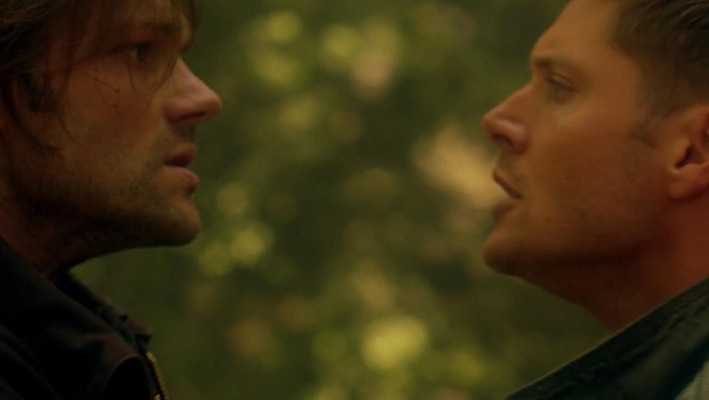
Supernatural Season 9 wisely begins where Season 8 ends: both in timeline and in emotional impact. It is immediately after “Sacrifice,” and all the speculation and questions can finally be answered in “I Think I’m Going to Like It Here.” We have two story lines making their trajectory across the screen, briefly meeting before becoming separate entirely. The first is that of Castiel’s condition and the aftermath of the fall of the angels. The other is that of Sam and Dean and the aftermath of Crowley’s near cure in the church. Both are full of layers and emotional impacts. Both answer questions and raise new ones. It sets us up for a wild ride in Season 9 for certain.
First, let us examine Castiel’s story line in this episode. Castiel has always been a supernatural being in some manner since his introduction. He’s been the obedient angel, the rebel angel, the megalomaniac angel turned god, the crazy angel, and the controlled angel. In all these cases, he ‘s always remained an angel. But here, with Metatron using his grace to cast all angels out of Heaven, crashing them in a “global meteor shower,” Castiel for the first time is not an angel. He is human—completely.
His story line seems simple on the surface. He trusted Metatron when he should not have, and instead of fixing what he had done wrong, he made it a hundred times worse. He believed that he was participating in the Angel Trials, leading to the closure of Heaven. Instead, it was a spell to cast the angels out. That’s the surface story for Castiel here. It seems rather cut and dried. Castiel trusted someone he shouldn’t and made a bigger mess than the one he was trying to clean up.
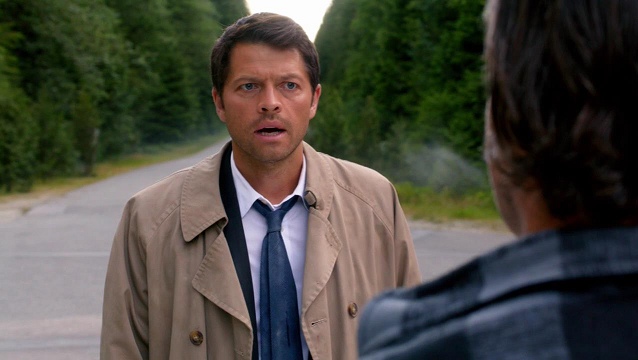
Dig deeper, and one can see just what his story stands for in many ways. It can be argued that Castiel is in fact a new Adam—cast from Paradise. In the story of the Fall of Man, Adam and Eve live in Eden, provided for by God. All food, shelter, and basic needs are given. In the biblical story, humans are there under God’s protection and love—but they must never ever eat the fruit of the Tree of Knowledge. To do so would expose them to the truth of the world: that good and evil exist.
We all know the story. Eve is tricked by the serpent into eating the fruit, and she offers it to Adam, who also eats. For their offense against God, they are cast out to the wide world. They are forced to provide food for themselves. They realize that they are nude beings and need clothing, and must find shelter of their own. It is a catastrophic event. They have lost the Garden forever—leaving humanity to cope with the aftermath.
Think of Castiel’s actions in season 8. He had taken in the angel tablet—a form of knowledge—and for that he is now cast out to the cold. It was his fruit of the Tree of Knowledge. The knowledge written upon it most certainly led Castiel to ruin. While the angel may not have read it himself, he let the angel who had written it mislead him. Metatron was his serpent in many ways—and now Castiel is cast out of his Garden of Eden: Heaven.
We see this transformation into the new Adam happen slowly through the episode. We see Castiel walking down the road, a solitary figure. We’ve seen him do this before—notably after he is “rescued” from Purgatory. He’s impervious to the elements and to the cars whizzing by—but not this time. Our first jolt—and his—into his new reality comes when he must jump out of the way of an oncoming truck. He has no choice but to dive into the dirt.
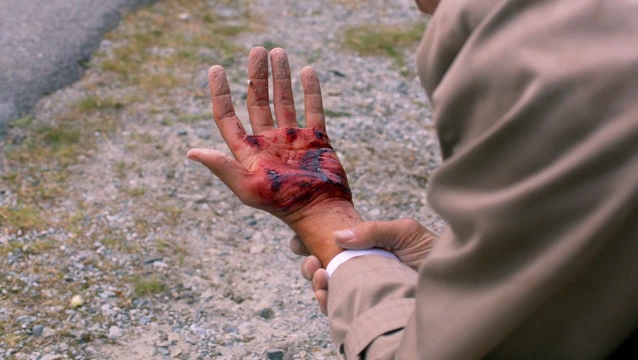
It is here that Castiel experiences his first human frailty. He moves to brush himself off from his tumble, only to find that his palm has been rendered bloody and torn. His flesh was once impervious to almost everything, and the sight of it stuns him. As does the stinging pain that causes him to wince slightly. It is such a slight wound—and yet it hurts more than he expects. He’s human and so he will take human wounds. But that isn’t enough for him to realize that he’s become the new Adam.
Castiel needs to reach out to Dean, but he can’t simply answer the distraught Winchester’s prayer—even if he can hear it. Like Anna before him, Angel Radio is the last vestige of his angelic self. Instead, he must use a phone, but the pay phone he spots already has a user. The old Castiel would have simply removed the obstacle by putting him to sleep—and in denial of his state—he tries to use his familiar finger trick. It fails, and if he isn’t careful he’ll find out what it feels like to be punched without the angelic strength to withstand it.
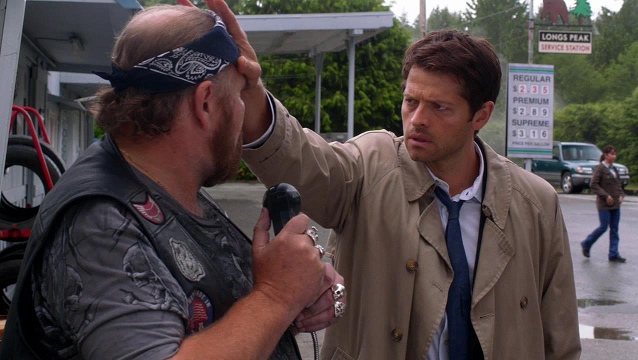
Our new Adam, however, isn’t alone long. He encounters another angel, named Hael, confused and distressed by the Fall. She is perplexed and frightened—yet not entirely friendly, either. Castiel, in his often misguided pursuit to redeem himself, tries to comfort her. In many ways, this is the blind leading the blind. Castiel is perhaps more lost than she is, adapting slowly to the human condition he now finds himself. And yet, he has now an advantage she does not: the ability to feel as a human being.
We can see him try, patiently asking Hael, “If you could do anything, what would you like to do?” It is a poignant question for the both of them. Hael has always followed the order and purpose of Heaven—and her last visit, if we are to believe her story, was long before man. She tells Castiel, “It was a normal day, and then just… dark. And then I was just… falling. How could that happen?” It is an unsettling reality for her and for all the angels.
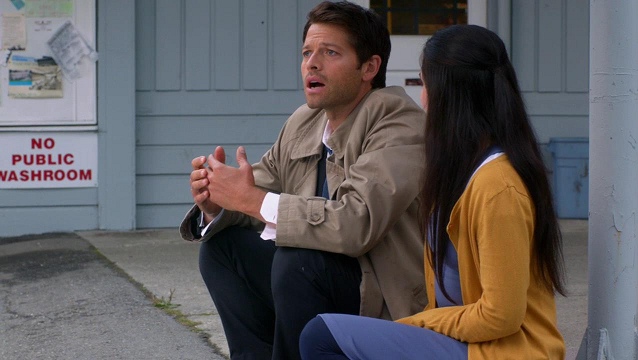
Hael stands in for the many angels we’ve yet to meet. She is the loss of the Garden personified. We feel sympathy for her and for the other angels—but we cannot condone her wrath. She is furious with Castiel for causing her to be cast into the cold, away from her home, and rendered purposeless. Hael wins us over, even if we know we shouldn’t trust her as Castiel does, in her earnest expressions, but it is all a set up for her scheme to punish the now human angel.
As our new Adam continues to adjust, he can’t simply let Hael follow through on her threat to take his vessel to replace her damaged one. In another example of his transition from divine being to mortal man, Castiel has the foresight to notice that the angel, who has no need of seat belts, is unbuckled in the car. He takes the time to buckle himself in so he can execute his escape plan—crashing the car. It works. Hael is ejected from the vehicle violently, but that’s not the end of her threat. She’s still an angel, and she will not be ignored.
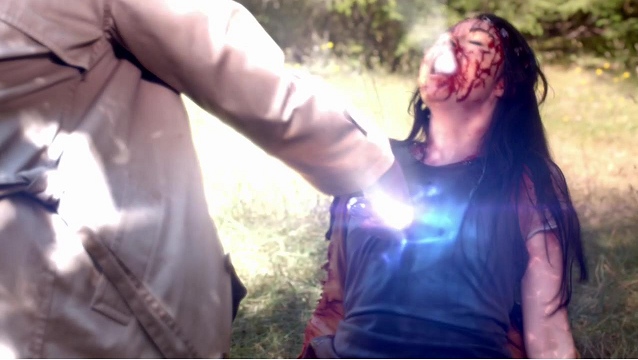
Castiel holds the familiar angel blade in his hand, the cool metal almost a comfort. Hael threatens to tell all the other fallen where he is if he does not give in, if he does not say “yes.” It is an unusual position for Castiel. He had been Hael at one point, seducing Jimmy Novak into surrendering his body to the angel in order to protect him and his family. Jimmy had said yes, but Castiel here must say no. He is forceful in this action—and as a mortal man he kills yet another of his angel family.
The killing of Hael, on the surface, is in order to keep Castiel’s location secret and to prevent her from forcing him to say yes. Underneath, his killing of Hael is symbolic in nature. It is, in ways, Castiel killing his own angelic self in the form of another angel. She represents what he once was—an obedient solider angel now lost and devoid of purpose. What walks away from her is now a mortal man, coming to the realization that he is no longer the wavelength of celestial intent we met all those seasons ago.
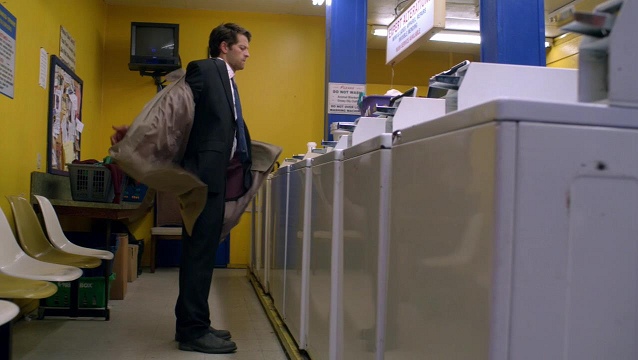
No more is this true than when we see a bloodied Castiel stumble into the laundromat. He looks weary, worn—human. We see him, in his socially awkward style, strip away the last symbol of his angelic self: his trenchcoat. Layer by layer, until he stands in his boxers alone, Castiel removes the angel and accepts the mortal man he’s become. It is a profound moment. He has truly become the new Adam, no longer in the Garden, no longer provided for by the divine.
He has to make decisions all humans have to make everyday. He has to choose between washing his clothes or acquiring water and food. It is a difficult choice for many in the world. The gestures of twirling the quarter show his indecision and dilemma well. Castiel can’t go without food—but he can’t go without clothing, either. What will he do now? The answer is not surprising: he steals another’s clothing and uses his quarters to get the needed water his body thirsts for.
Castiel as the new Adam isn’t simply about being cast from the Garden known as Heaven. It is also a story about Free Will—a current that has been laced through this show since at least season 5. Castiel asked Hael what she would like to do—and now he must ask himself just that. What will he do? What would he like to do? As an angel, he tried to understand the nature of Free Will, and yet in many ways he simply could not grasp it. He was too far removed, too angelic to gain understanding of such a concept. His existence had been to follow orders as an angel. Now that he is mortal, he must explore the question all of us mortals have to answer: what do we want to do?
We, as humanity, have been exploring that since the expulsion from the symbolic or literal Garden of Eden. We have spent our time on Earth trying to answer the difficult questions. Who are we? What are we? Why are we? What does it all mean? Now Castiel must sit down and face these questions himself. Considering the crisis facing the Winchesters, it seems that the angel turned human will have to do all of this largely alone—dodging other Haels waiting to take his vessel or exact revenge upon the one responsible for casting them from Heaven in the first place. His character raises many questions—about angels, about divinity, about humanity, about what having Free Will means.
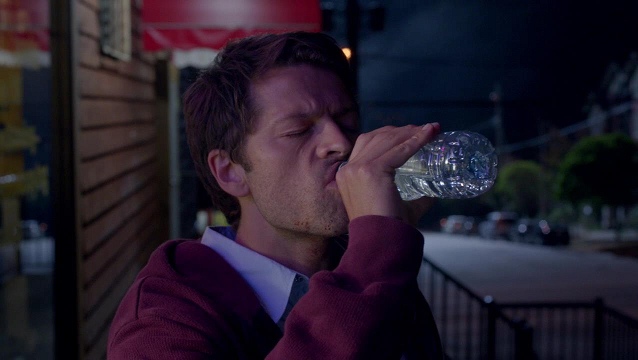
Season 9 has presented us with a unique and new Castiel. He is no longer the Angel of the Lord—the supernatural being we’ve come to know. He is no longer able to instantly heal or teleport or kill demons with a simple thought or touch. He can’t kill monsters with grace. Castiel has made many errors of judgment that has led to this—not pulling all of Sam from Hell, working with Crowley, breaking the Wall, and trusting Metatron to name a few. He has tried to atone for these and has failed as an angel. Perhaps he can gain forgiveness and true understanding of what it all means as a mere mortal.
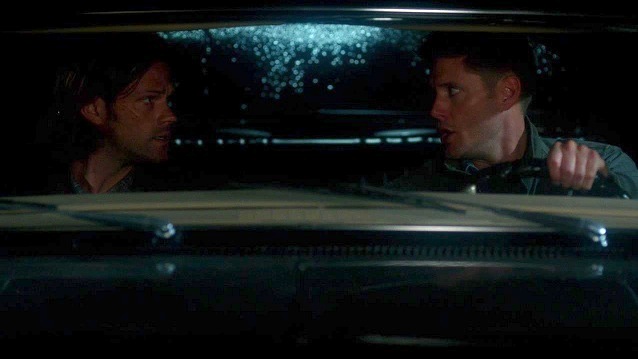
The other story line cuts straight to the heart and soul of Supernatural: Sam and Dean’s story.
In the THEN section, we hear Charlie state the premise of not just this episode and season opener, but the series as a whole: “There is pretty much nothing the Winchesters can’t do if they work together.” It’s the thesis, the genesis of the show’s story—the Winchesters working together as a single unit towards something.
It begins in the aftermath of the failed Trials, with Sam’s life hanging on by the frailest of threads. We are lulled at first, by seeing Sam and Dean in their familiar seats, cruising down the road in the Impala. Sam is asking his brother what will happen next, how to proceed—when Dean tells him the brutal truth: “You understand that we’re not really in this car right now. We are in your head, and you’re in a coma and are dying.” But this is Dean here, and as always, Dean has a plan.
This story line is emotional and powerful on the surface—but hits hardest when examined much closer. Sam has a choice to make: to live or to die—and yet it is not only about him. There’s a reason that Sam and Dean’s names are linked always by the ampersand. They are not really two people. They have always been one individual—split down the middle into two. It’s why neither can truly stay dead and why they will risk everything time and time again for one another. Nothing sums that argument up better than the line, “If there ain’t no you there ain’t no me.” But how does the story get there to punch us in the gut?
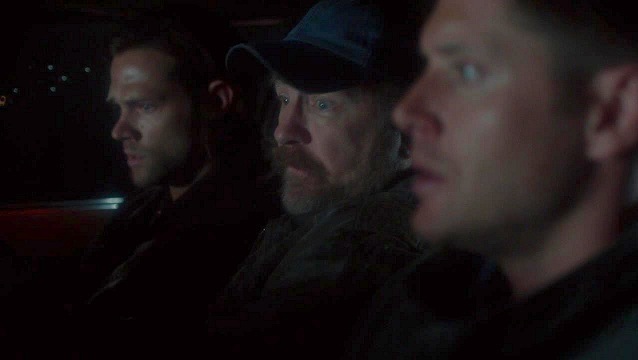
Sam is confronted by another specter—in the form of Bobby—representing the choice to die. It’s crucial that this voice take this form. Bobby is someone Sam will listen to. He’s not necessarily wrong, either. Sam is dying and it would be best if he went with a reaper to the afterlife than attempt what Bobby had in staying. Sam would only suffer and make others suffer if he remained as a spirit—eventually becoming vengeful and twisted. It would seem either way his goose is cooked and there’s not much he or anyone can really do about it. At least not from inside his own dying mind.
Sam has heard Dean’s argument—but not the plan as the projected Dean has none. And so, as he goes with Bobby, it makes more and more sense to let go of it all. And yet, we know that he can’t. He told Dean at the start of these Trials that he wants to live. The first one was to kill a hellhound, and Sam tells Dean emphatically, “I want to kill a hell hound and not die. How about you?” In the car with Dean, he pleads that his stopping the trials was in order to live. But now he’s facing the age old question about life and death.
In many ways Sam’s progression in this portion of the story line is the stages of grief personified. He begins with denial, angrily telling Dean that he’s wrong. He slowly moves through them, right up to the cabin that will hold Death, accepting that this is it once he walks through that door. But we know that Sam can’t do this—can’t actually follow through with Death. He is one half of the equation—the other doesn’t want to die, not yet.
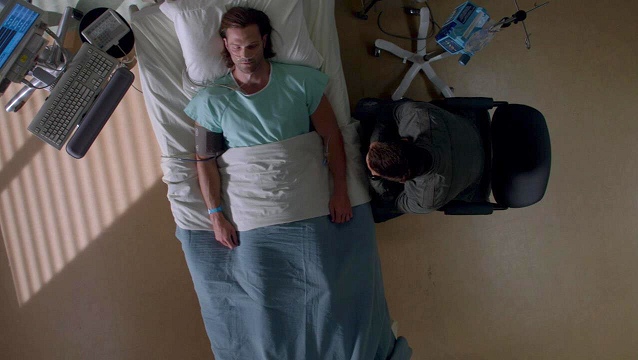
Sure, Sam and Dean are two separate people physically and personality wise. They see the world differently and have had different experiences. Sam is more analytical and cautious. He has more outward empathy and compassion. Sam is into research and pondering what they’ve seen and done. Dean is more shoot first ask questions later. He is brasher, reckless at times, and devil may care. But really, there is no story without the two of them. It is Sam and Dean or better put SamandDean. They’re one unit, and it is that united strength that makes it possible for them to do what they do.
As long as one has the will to live in some form, the other cannot die permanently. Not really. They’re so intricately twisted together that it is impossible to imagine there’s any scenario where they don’t go together.
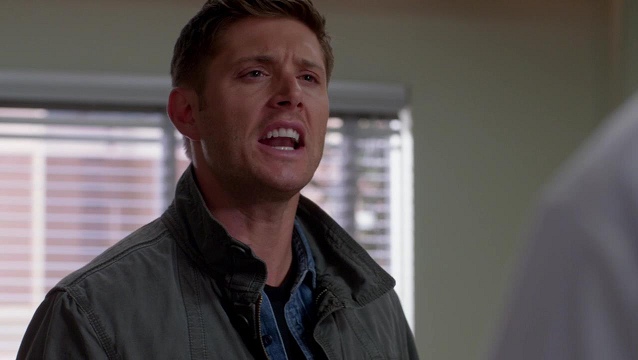
While Sam is staring Death literally in the face, Dean is desperately trying to do anything and everything he can to keep one half of their unit alive. He is furious with the doctors, knowing that while they may give up and surrender, he never can. We’ve seen him do it in the past—most notably at the end of “All Hell Breaks Loose Part I.” He will do whatever it takes to get Sam back healthy.
But it will take more than he thinks to pull Sam back from the brink this time. Desperate for any help he can get, Dean trudges to the chapel to pray to Castiel—and when that falls on deaf ears he blares out openly, “This one goes out to any angel with their ears on.” He’s taking a huge risk, but really, Dean has nothing left to lose. There’s really no bullets left in the gun here—and if it should fail he won’t care what the angels do to him. And so, he prays earnestly and fervently and harder than he has ever in the past—needing his brother to be healed.
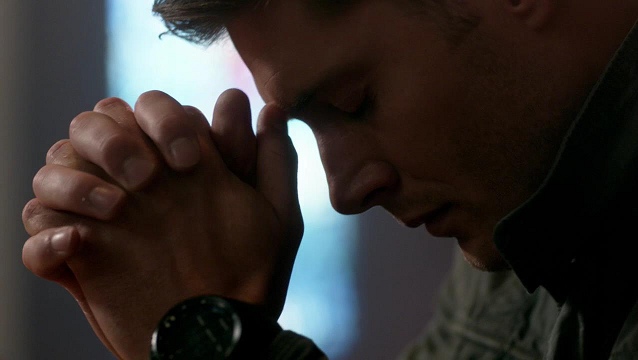
It is heartbreaking and moving to see how far he’ll go—even if we know there will be dangerous consequences.
Meanwhile in Sam’s half of the story line, it is crucial that Dean appear as the will to live in Sam’s mind. For so long, Dean has been his touchstone, his “stone number one,” his big brother—essentially the most important person in Sam’s life. It is no surprise that it would be Dean’s visage and voice telling him to fight, to not give up, to live. That being said, it isn’t entirely shocking that after the physical altercation between Sam and the Dean in his mind, that Sam chooses to let go.
On the surface, this looks like the unit they are has broken down or that it is one sided—but when we hear what Sam has to say in the cabin to Death, we are shattered by his reasoning. He he has one request: “If I go with you… can you promise that this time it will be final? That if I’m dead, I stay dead. Nobody can reverse it, nobody can deal it away… and nobody else can get hurt because of me.”
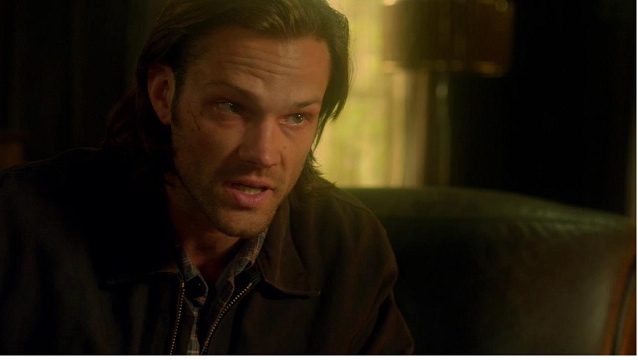
He doesn’t want anyone to get hurt—and that means Dean especially. When he died last time, Dean sold his soul, and it sent his brother to Hell—despite all of Sam’s efforts in that last year. His life being restored by a deal led to his greatest let down of Dean: not stopping it. Dean died so that he could live. He could not imagine going through that again—or making his brother go through that again.
It’s a profound statement in Sam’s broken voice. He isn’t leaving Dean because he wants to—he’s leaving because he has to in order to save him from the hurt that would come if Dean did something to bring him back again.
What Sam confessed in “Sacrifice,”—to letting Dean down as his greatest sin—points to one sin over all the others. He could not save Dean from his Deal, and it caused so much pain and suffering in the end. He had let his brother down, had failed to save him, and that weight has hung heavy on his shoulders. It would be unbearable to have to endure that type of horror again. The agony of the responsibility—right or wrong—would be far too heavy to carry a second time.
Sam knows his brother well, and he’s right to be concerned. Dean asks the grief councilor immediately if she’s an angel—only to be disappointed. When he thinks things over, he exclaims, “I’ve got the King of Hell in my trunk.”
Nearly cured as Crowley may be, he’s probably still a demon on some level—and a crossroads one at that. It’s not hard to imagine that in order to save Sam, Dean would sell his soul and more to make it happen. He is desperate enough here—trying to save one half of their brotherly unit against all odds.
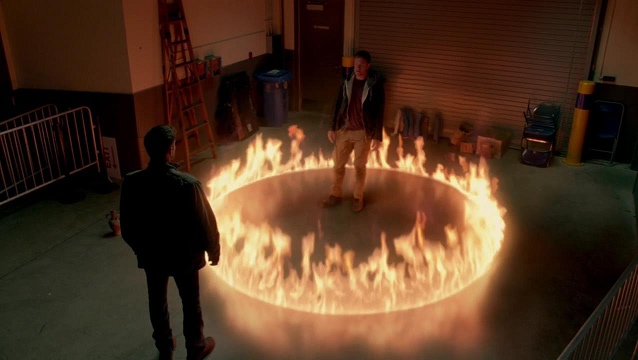
But angels have heard Dean’s prayers—although not all of them are friendly. Before he can even open the trunk to talk to Crowley, an angel has attacked—and another is already entering the fight. The second one isn’t there to fight with Dean. He’s there to help—but he is weakened by the Fall. Dean may have asked for angelic assistance, but that doesn’t mean he trusts this angel automatically. He demands a name—Ezekiel—and he wants to believe this angel’s sincerity—as do we. But should Dean? Should we?
Ezekiel knows that to help Dean will forever put him in the angel’s debt. He knows that it will give him leverage. And yet, he doesn’t use such language with Dean. He tells him that he believes in “Castiel and you.” He professes to believe in the original message to protect humanity. Automatically, even in this desperate state, Dean must think of agendas. What does Ezekiel really want? It is a question that will be explored as we go through the season for certain.
Dean allows Ezekiel to help him—knowing that beggars can’t be choosers. He allows the angel into the room to assess the damage, and finds that it’s far worse than he could have ever imagined. Sam is weak and growing weaker by the moment. The “inevitable” the grief councilor spoke of is almost nigh it would seem.
But that doesn’t mean hope is lost.
Ezekiel shows Dean just how close Sam is to making the final choice—and it prompts a debate between the two about what to do. The only way for him to heal Sam is from the inside—by possessing him. It is this plan that makes us question Ezekiel’s motives the most. After all, Sam is Lucifer’s former vessel, strong and durable to withstand angelic possession. Does he truly want to help Sam out of the goodness of his heart—or is he looking to hitch a ride for good?
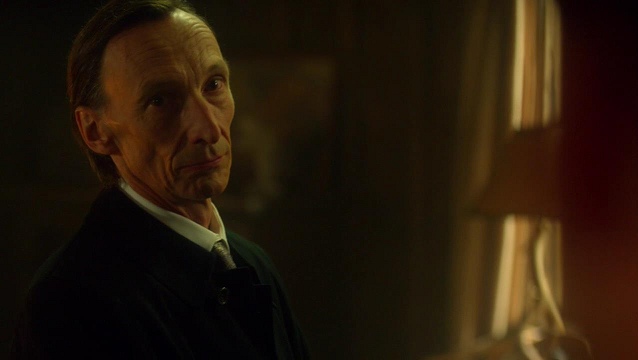
Dean can’t think of that now. It’s play the hand dealt—he gives in and accepts Ezekiel’s plan. We see him enter the cabin where Sam is chatting with Death—about to take the final plunge. Death seems unsurprised, half expecting the eleventh hour rescue. It’s not hard to imagine that Death knows the truth of the matter—you can only reap the Winchesters together as a package deal. They are too intertwined to truly go separately.
It is Dean’s insistence and emotional pleas that break us here. He reminds Sam that they promised one another in that church to stand together against whatever. Sam is slowly swinging back to choosing life, but not quite. Dean needs to seal the deal—and he does with impact. He cries, “If there ain’t no you there ain’t no me.”
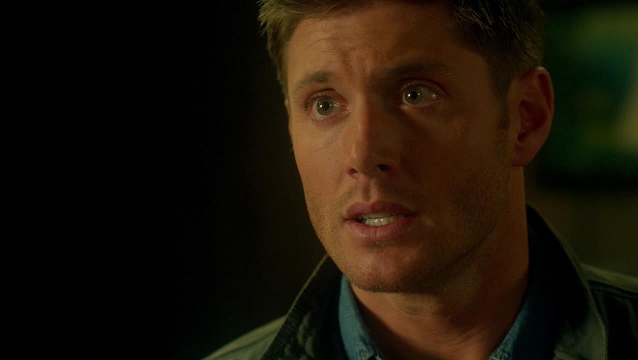
And it is the absolute and naked truth laid bare before Sam, Dean, Death, and all.
There is no Sam without Dean and no Dean without Sam—and every single time either has tried to walk the path alone it has ended in misery and disaster.
They say that love can conquer all, and when we see Dean pull Sam from the very edge of death, we see that it really can if we let it.
But that doesn’t mean it doesn’t come with consequences. This isn’t done by just love alone. After all, Ezekiel has gotten Sam to say “yes” and that allows him to possess the younger Winchester. It also sets up a can of worms waiting to explode at some later date. What will Sam say when he finds out what Dean has done? Will he—can he—understand why?
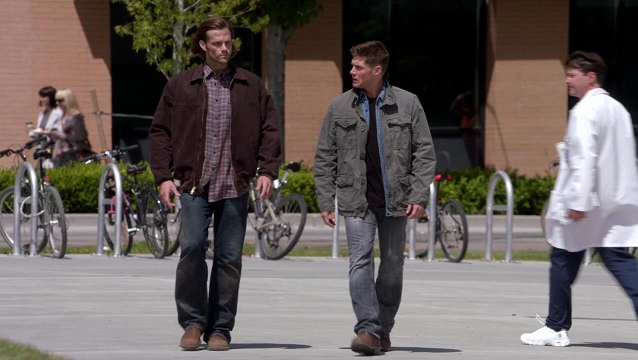
In Sam’s form, Ezekiel makes us want to believe his intentions. We want to buy in as Dean has—but are hesitant. He seems gentler than Lucifer, seeking more mutual benefit than domination. There’s a stoic compassion in his voice as he tells Dean, “There is much work to be done.”
And as he proposes not telling Sam, Dean sees the trap for what it is. He knows secrets always come back on them, but what choice does he really have? He says, “Then we keep it a secret for now. Or until Sam’s well enough that he doesn’t need an angelic pacemaker or I find a way to tell him.”
As Sam wakes up in the Impala, not unlike the scene we saw in the opening scene, he is tired and a bit confused about what has happened. There’s an easy routine, however, to riding shotgun and it could possibly be the best medicine Sam needs—even better than angelic healing. Quickly, Sam falls into teasing his brother.
But even this scene punctuates the truth about Sam and Dean.
Ezekiel may have erased the moment in the cabin from Sam’s mind—but Dean won’t allow that to pass entirely by. He tells Sam, “I knew you’d pull through. I meant what I said in the church. You’re capable of anything Sam. And hell if you didn’t prove me right.”
There’s truth here—even if Dean’s lying about Sam’s recovery. Sam told Dean in “Sacrifice,” “I mean, you think I screw up everything I try.” Here, big brother is telling little brother that he believes in him—and them. This is exactly what Sam needs to hear—and could be the greatest cure for what ails him—heart, mind, body, and most of all, soul.
And Sam responds in a manner only a Winchester could, “Good. ‘Cause we’ve got work to do.”
They most certainly do. With the angels falling, the King of Hell in their trunk, and so many other things to tackle, the Winchesters had best be out on the road doing what they do best. Hunting things. Saving People. The Family Business.
And they had better do that the best way they know how: together as SamandDean.
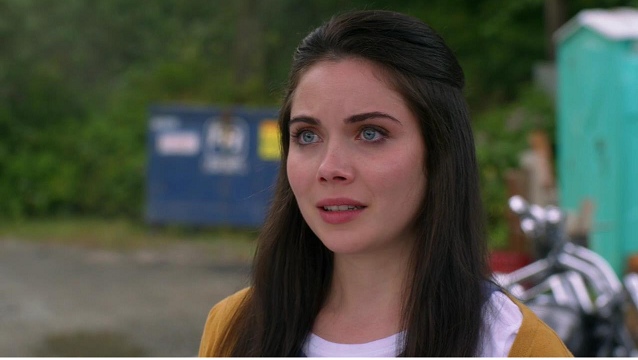
Grace Phipps plays a confused yet vengeful angel. Hael begs Castiel to show her how to live on Earth, and we want to buy into her innocent act, but Phipps makes sure we can sense early on that she’s not as befuddled as Castiel wants to believe. She does sell it well, however, when she speaks about Heaven having a purpose, and now that it is gone she is drifting aimlessly—but she has a plan. Once it is revealed that she is indeed working against Castiel, we see Phipps switch her portrayal, becoming a bit darker and the vengeful angel we’ve come to see on the show in the past. She wants Castiel’s vessel, and she will take advantage of Castiel’s state to get it. When she’s confronted with Castiel in the end, Phipps gives her an edge in tone and body language. She is spiteful and angry, not unlike a wounded animal cornered. Hael may have been around briefly, but Phipps made her performance count as she showed us how the fall of the angels has hit all of them hard, standing in for so many yet to be met.
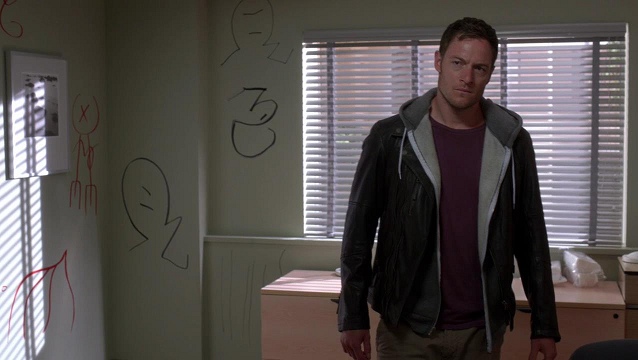
Tahmoh Penikett presents our newest angel in Ezekiel. Penkiett makes us want to trust him—even though we’re not sure we should. He has a compassion in his portrayal, especially when we see Ezekiel plead with his brother about their mission and purpose. His delivery of the line, “are we creatures of wrath or compassion” tugs on us, making not only angels have to consider who and what they are, but what we as humans and viewers think they are. And yet, Penikett leaves the door open in his performance for us to speculate about his motives. Does he take advantage of Dean’s desperation to possess Sam, Lucifer’s vessel? He’s convincing, but Penikett is wise to leave those doubts in question as he speaks the lines and Ezekiel sells his proposal to Dean. Once Ezekiel leaves, Penikett shows us a terrified man, left behind to deal with the aftermath. With the angel moving onto Sam, it’s a wonder if we’ll see Penikett yet again.
Julian Richings reprises Death, this time arriving of his own accord. He is there to collect Sam, and Richings puts everything into this performance. Death is always calm and unflappable, and he’s no different here. Richings makes the conversation between Death and Sam moving and comfortable. He shows us that Death wants Sam to go with him—after all it would be his “honor to collect the likes of Sam Winchester,” and yet when Dean crashes the party, Richings keeps Death’s expression unsurprised. He also shows how free will also impacts his work, giving Sam the choice to go with him or to go with Dean. Richings is always a treat to see because he makes Death an interesting character—none of the trappings of stereotype. He’s beyond the black robe and scythe. Richings makes Death seem older than the universe, infinitely powerful, and all together rational. In theory, he should be a villain, and yet Richings makes him so much more in his performance. He’s a necessary force doing necessary work, and Richings gives us that sense each time he appears.
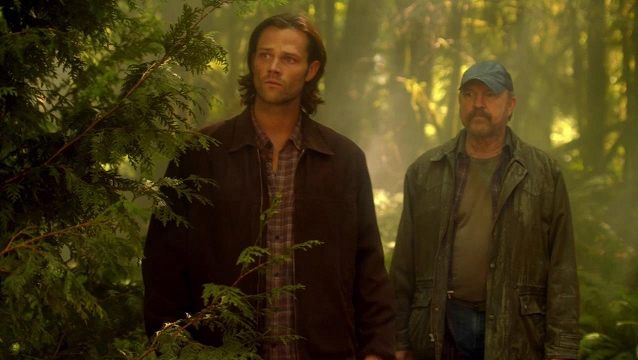
Jim Beaver makes an unusual but moving appearance in this season opener. Beaver reprises Bobby—in a roundabout way. He’s the voice of accepting death in Sam’s head—telling him “when it’s your time, go,” but there’s a difference here in his performance. There’s the hallmarks of Bobby’s crotchety behavior and subtle humor—his comment about Dean being too talkative was spot on in delivery—but there’s enough differences to realize this isn’t quite Bobby. Beaver’s Bobby appeals to the goodness in Sam, to his “legacy” of saving the world—and echoes what was told to him in “Death’s Door,” about having done enough. He provides a convincing argument for Sam accepting the end, giving a warmth to the situation that only he could provide as the character Bobby. His line “I’ll have some cold ones ready” makes us want to buy in just as much—even if we know that Sam won’t die here. Let’s hope we’ll see Bobby some time down the road!
Misha Collins has presented us with several versions of Castiel through the seasons since the character’s debut. He’s been the powerful and obedient solider. He’s been the rebel angel. Castiel has been “god.” He’s been insane. He’s been controlled. Each hat brings a new layer to his character. Season 9 is no exception. Collins presents us with the newest form of Castiel: human. He’s portraying Castiel as that angel we met all those seasons ago—yet more bewildered and befuddled. He’s as naïve as ever, trusting a fellow angel that has ill designs—and yet Collins presents this new Castiel with enough differences to show us how being rendered human has changed him. We see him approach the phone booth to call Dean, and Collins draws out some laughs as he tries to use just his fingers and grace to put the man to sleep—when it doesn’t work, his confused expression seals the deal. We see Castiel have the foresight to buckle himself into the car so that when it crashes he isn’t flung out through the windshield. Collins makes this gesture subtle, yet profound. Prior to his new condition, Castiel would have never taken such action. But the scene that really shows us that this is yet another version of the nerd angel is the scene in the laundromat. Castiel has arrived covered in blood, and Collins gives us every inch of the powerful angel his character once was only to strip his clothes off—and along with it his last vestige of divinity—to steal other clothes and drink greedily water that he has never needed before. It is one more transformation for Castiel, and Collins makes it tangible beyond just the actions his character takes. It is as if we can see the angel become a man before our eyes in the softening of expression and the weariness that’s never been seen on his face before. It will become intriguing to see how Collins portrays that progression throughout season 9.
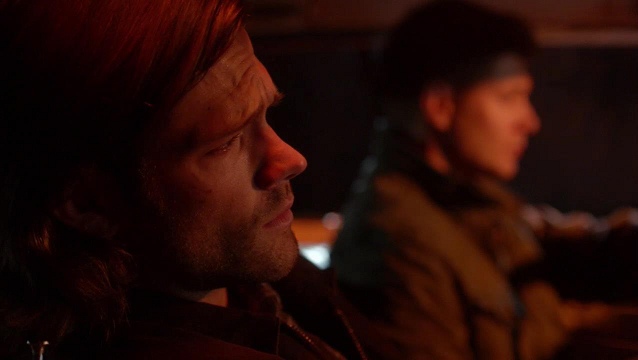
Jensen Ackles impacts emotionally from start to finish in this brilliant performance. We feel what Dean feels deeply just by facial expressions and tone of voice. When he’s angry about it being in God’s hands, we can hear the frustration and rage in the timbre of his voice. Our hearts break on the shaky yet determined prayers made to the angels in Dean’s hour of need, his desperation beyond tangible. When Dean is confronted by Ezekiel, we see hope blossom in his expressions. When he is confronted and beaten by angels, we see the full determinations that only Dean Winchester can muster—all in order to protect his brother. Ackles makes sure we can see Dean’s genius in the use of the sigil, selling us on the action all while still being human. He personifies the “never quit” attitude in this performance. Ackles is doing double duty in this episode, too. He’s the other side of the argument—the will to live—in Sam’s head. This performance is just as powerful. He makes as many equal and powerful arguments to Bobby’s, and Ackles sells us on them, making us along with Sam want to believe. It is painful to watch Dean attack Sam with his fists—and yet Ackles shows us the purpose behind each strike. He wants to shove his will to live, his anger into Sam and wake him up. But Ackles drives Dean’s argument home most when he says, his voice shaky and emotional, “There ain’t no me if there ain’t no you.” It makes us gasp and cry in its delivery.
Jared Padalecki takes on many hats in this episode—from dying patient to confronting Death to becoming possessed by an angel to waking tired and confused. In each role, Padalecki delivers. He makes us feel deeply for Sam’s dilemma. In many ways, Padalecki’s performance is the stages of grief come to life, beyond simple concept and into the concrete reality—albeit in Sam’s head. Should he stay or go? Padalecki shows us a determined Sam in the beginning, wanting to live. Slowly, he shows us that transition to letting go and moving onto the afterlife. His performance here makes our hearts hurt as we hear Sam say firmly that he doesn’t want to hurt anyone ever again by being brought back yet again—Padalecki puts this all in the tone of his voice and his body language. His voice breaks ever so slightly, and we know that for Sam this is a hard choice. When Dean arrives to pull him back, we see a repeat performance of “Sacrifice.” Padalecki’s chemistry with Ackles seals everything in this scene, making his soft pleading, “What do I have to do?” all the more heartbreaking. After it is done, Padalecki shows us just how different Ezekiel is from Sam—all in body language, tone of voice, and expression. It’s different than his performances as Lucifer—softer almost. His performance as Ezekiel is more stoic than as Sam, yet not chilling or arrogant as it was when he played Lucifer. His portrayal makes us want to believe Ezekiel’s intentions—as the compassion of his character runs like a subtle current underneath. Once awake as Sam, we see the inner steel pulled to the forefront by Padalecki, especially in the final line of “Good. ‘Cause we’ve got work to do.”
Best Lines of the Week:
Dean: There ain’t no me if there ain’t no you.
Sam: Good. ‘Cause we’ve got work to do.
Dean: Anybody ever tell you you hit like an angel?
Ezekiel: Are we creatures of wrath or compassion? I would argue the latter.
Bobby: Yip, yip, yip. Am I right?
Castiel: I would fly, but I – I have no wings, not anymore.
Sam: But if you’re you but you’re really me and you’re the part of me that wants to fight to live…
Death: I consider it to be quite the honor to be collecting the likes of Sam Winchester.
With Sam back on his feet—in a manner of speaking—it’s time to see just what has become of the King of Hell. Just how “cured” is Crowley?



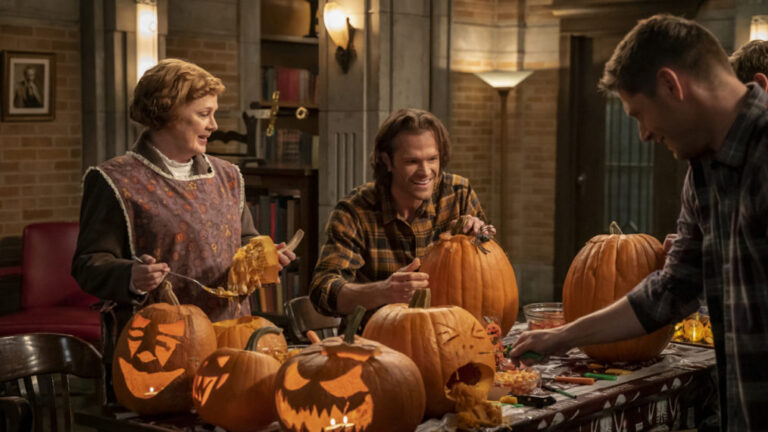
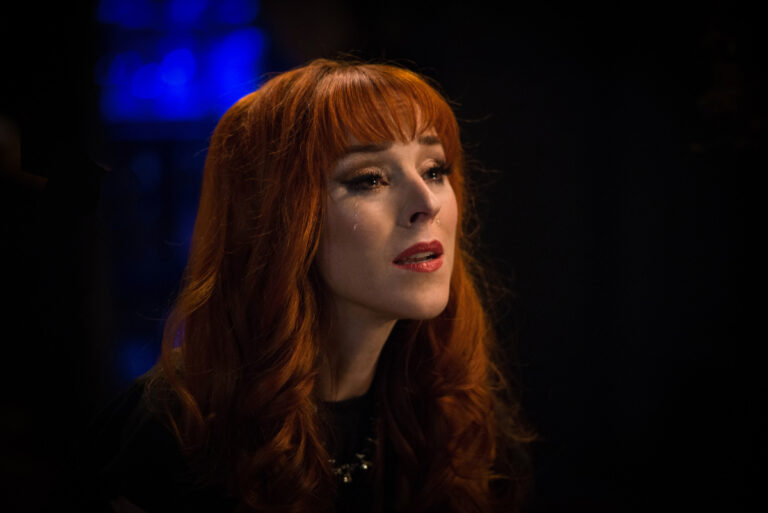

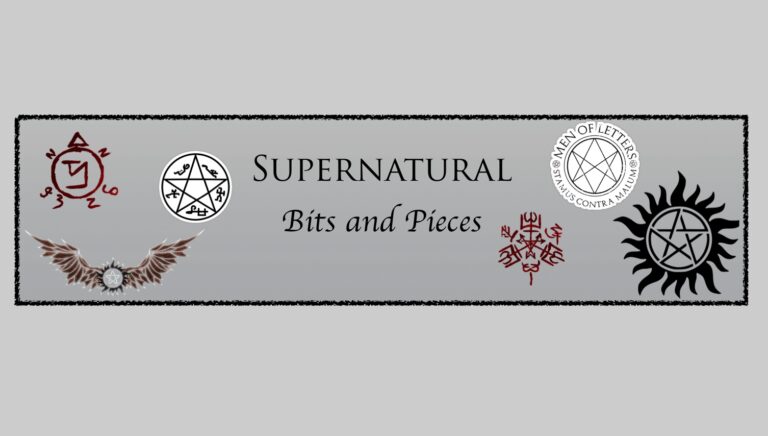
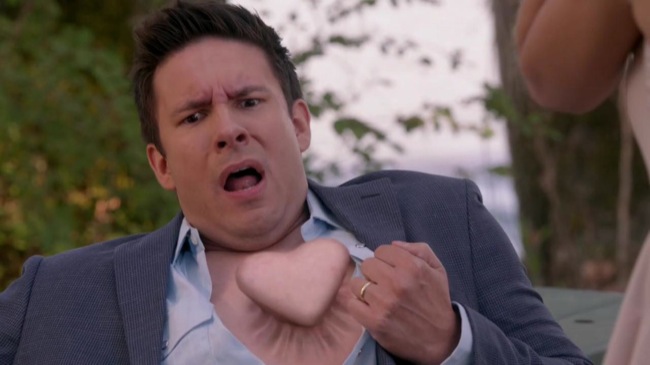
regarding this post, i have one word for you….beautiful…. 🙂
thanks for the awesome read.
[quote]regarding this post, i have one word for you….beautiful…. 🙂
thanks for the awesome read.[/quote]
I’m glad you enjoyed it so much. It was a joy to write it.
Ahhh, seigh… beautiful. Danke schön! “Good. ‘Cause we’ve got work to do.“
Actually I was a tiny little bit skeptical, if the screenwriters could hook me up. Because the last season started quite low on my curiosity barometer, it was like ah ok lets see how that is going to work out. And than every week it started getting a bit interesting, my curiosity increased more and more and than the last sequel aired kawboom… O_O. Left with a 5 month hiatus, how could they dare! Now reading your review, I forgot that I survived the hiatus, only to find out that I have to survive now seven days. Oh why are they so cruel to us? Why can’t SPN just be an average TV show were you tune in, are being nicely entertained and that was it.
Thank you Far Away Eyes, for reminding me, that I’m an adict. 😆
— “Sure, Sam and Dean are two separate people physically and personality wise. They see the world differently and have had different experiences. Sam is more analytical and cautious. He has more outward empathy and compassion. Sam is into research and pondering what they’ve seen and done. Dean is more shoot first ask questions later. He is brasher, reckless at times, and devil may care. “–
Its sad that u see Dean this way. I think he has a soft core that is full of compassion and understanding. U forget that he is the one who didn’t want the virgin to die or the one who didn’t want Cass to torture a kid to get Balthazar’s name. Its odd that people seem to think only Sam has empathy. Dean is wonderful with kids, shows total love, understanding and loyalty towards all his friends. I agree that Sam is a wonderful human being but so is Dean. He is not defined by just the devil may care attitude.
Other than that point I liked your review. Its well written and enjoyable. Great analysis of the Cass storyline.
[quote]– “Sure, Sam and Dean are two separate people physically and personality wise. They see the world differently and have had different experiences. Sam is more analytical and cautious. He has more outward empathy and compassion. Sam is into research and pondering what they’ve seen and done. Dean is more shoot first ask questions later. He is brasher, reckless at times, and devil may care. “–
Its sad that u see Dean this way. I think he has a soft core that is full of compassion and understanding. U forget that he is the one who didn’t want the virgin to die or the one who didn’t want Cass to torture a kid to get Balthazar’s name. Its odd that people seem to think only Sam has empathy. Dean is wonderful with kids, shows total love, understanding and loyalty towards all his friends. I agree that Sam is a wonderful human being but so is Dean. He is not defined by just the devil may care attitude.
Other than that point I liked your review. Its well written and enjoyable. Great analysis of the Cass storyline.[/quote]
[quote]– “Sure, Sam and Dean are two separate people physically and personality wise. They see the world differently and have had different experiences. Sam is more analytical and cautious. He has more outward empathy and compassion. Sam is into research and pondering what they’ve seen and done. Dean is more shoot first ask questions later. He is brasher, reckless at times, and devil may care. “–
Its sad that u see Dean this way. I think he has a soft core that is full of compassion and understanding. U forget that he is the one who didn’t want the virgin to die or the one who didn’t want Cass to torture a kid to get Balthazar’s name. Its odd that people seem to think only Sam has empathy. Dean is wonderful with kids, shows total love, understanding and loyalty towards all his friends. I agree that Sam is a wonderful human being but so is Dean. He is not defined by just the devil may care attitude.
Other than that point I liked your review. Its well written and enjoyable. Great analysis of the Cass storyline.[/quote]
I’m sorry you feel I shortchanged Dean here. Sam is tended to be more OUTWARDLY empathetic. I agree with you that Dean is full of compassion. We see it every time that he deals with a child or Charlie or someone in need. He, however, shows that in a much more reserved manner. Instead of the openly worded comforts that Sam provides, such as “I’m here for you,” or “Sorry for your loss,” Dean shows all of his empathy in action. I perhaps should have worded it that way.
Thanks for enjoying the Castiel analysis!
[quote]Ahhh, seigh… beautiful. Danke schön! “Good. ‘Cause we’ve got work to do.“
Actually I was a tiny little bit skeptical, if the screenwriters could hook me up. Because the last season started quite low on my curiosity barometer, it was like ah ok lets see how that is going to work out. And than every week it started getting a bit interesting, my curiosity increased more and more and than the last sequel aired kawboom… O_O. Left with a 5 month hiatus, how could they dare! Now reading your review, I forgot that I survived the hiatus, only to find out that I have to survive now seven days. Oh why are they so cruel to us? Why can’t SPN just be an average TV show were you tune in, are being nicely entertained and that was it.
Thank you Far Away Eyes, for reminding me, that I’m an adict. :lol:[/quote]
I’m glad you enjoyed the review so much. It was a fun one to write and I’m glad it’s touched others so much. I don’t know how we can wait so long between episodes, either! It’s hard! Thanks again.
That was beautifully written. You reminded me why I love the show (althought I don’t really need reminders 😛 ) you get right to the heart of why we love these characters and why there is no Dean without Sam. They are one. I also particularly loved what you wrote about Julian Richings…I’ve always had trouble explaining why I love Julian Richings’ Death. Now I will refer people to this article if I ever have trouble explaining it again. Again, beautifully written. Thank you.
[quote]That was beautifully written. You reminded me why I love the show (althought I don’t really need reminders 😛 ) you get right to the heart of why we love these characters and why there is no Dean without Sam. They are one. I also particularly loved what you wrote about Julian Richings…I’ve always had trouble explaining why I love Julian Richings’ Death. Now I will refer people to this article if I ever have trouble explaining it again. Again, beautifully written. Thank you.[/quote]
Thank you. I’m glad you enjoyed this review so much. I guess, for me, it’s hard to imagine the show ever being just one or the other, and I felt this episode captured that well.
As for Richings, he’s just cool. No ifs and or buts about it. Death is usually considered a baddie in most stories, but how can we be angry with what is necessary? He’s just awesome in his performances, too. Always look forward to seeing Death (well most of the time!)
Thanks again.
Fantastic review. Your study of Castiel’s fall and the comparison with Adam’s rejection of Eden was an incredible perspective to offer on Cas’ transition to the human world and the path he followed to get there.
I also loved your psychological analysis of Sam and Dean and the idea that so long as one has the will to live, the other can’t truly follow Death into that final sunset.
This was an exceptional look a great season opener – thank you for this piece – loved your perspective on the episode!
[quote]Fantastic review. Your study of Castiel’s fall and the comparison with Adam’s rejection of Eden was an incredible perspective to offer on Cas’ transition to the human world and the path he followed to get there.
I also loved your psychological analysis of Sam and Dean and the idea that so long as one has the will to live, the other can’t truly follow Death into that final sunset.
This was an exceptional look a great season opener – thank you for this piece – loved your perspective on the episode![/quote]
Thank you. I’m pleased you liked my thoughts on both story lines. I don’t know when we’ll see them intersect again, but I noticed they seemed to have split the two.
Castiel has had an interesting development by becoming human, if you ask me. It makes me want to follow his character more. He had the divine power and now he’s mere mortal, and I think it’ll be a fascinating exposition on the human condition going forward. That’s exciting to me, rather than seeing an angel try to understand humanity while still being an angel.
As for Sam and Dean, thank you. They really are the heart and soul of this show, and I feel that this season opener captured why beautifully. I’m glad you feel I conveyed that well. I think it’s true that they will only die as a complete set—which is true to both of them.
Thanks again.
Great review. I have a question I want to ask about Death. If, as Dean said, they were all Sam (when in his head) then was Death . . . Death or Sam/Death?
[quote]Great review. I have a question I want to ask about Death. If, as Dean said, they were all Sam (when in his head) then was Death . . . Death or Sam/Death?[/quote]
My guess is that Death is really Death. We know from
Bobby’s experience that a reaper can enter the dying mind, so that wold be simple for Death himself.
Thanks and I’m glad you enjoyed the review!
Somehow I’d missed your review being posted, FarAwayEyes! Nice review, thanks.
I agree – I’m really hoping that Death was actually Death. I think if Sam had imagined a reaper, it would have more likely been Tessa. He’d met and worked with her before, and I think he respected her.
[quote]Somehow I’d missed your review being posted, FarAwayEyes! Nice review, thanks.
I agree – I’m really hoping that Death was actually Death. I think if Sam had imagined a reaper, it would have more likely been Tessa. He’d met and worked with her before, and I think he respected her.[/quote]
Thanks. I’m glad you enjoyed my take.
I agree. I think Death was Death. I do think Sam really respected Tessa, and I think it’d make sense he’d project her otherwise. Sam was really surprised by Death being in the cabin.
Thanks again.
Far-Away-Eyes- Thank you for the lovely review. I agree, despite some stuff out there that might call it into question, that it was Death there with Sam. I will continue to hold that belief until a director, producer, or JC says otherwise. I agree that these brothers will most likely depart earth for the last and final time, together. Although it would be so sweet if they could find some happiness and “light at the end of the tunnel” on earth beforehand.
[quote]Far-Away-Eyes- Thank you for the lovely review. I agree, despite some stuff out there that might call it into question, that it was Death there with Sam. I will continue to hold that belief until a director, producer, or JC says otherwise. I agree that these brothers will most likely depart earth for the last and final time, together. Although it would be so sweet if they could find some happiness and “light at the end of the tunnel” on earth beforehand.[/quote]
The way I see it, what happened outside the cabin was in Sam’s mind. Inside that cabin? That was actually Death and Dean/Ezekiel. I, like you, will wait to see if the show or a member of TPTB say otherwise.
I’m glad you liked my take. I’d like to think that the brothers can get that “light at the end of the tunnel” before they go together into the after life. It’s only fair after all they’ve done!
Thanks again.